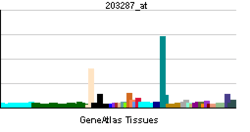LAD1
| Ladinin 1 | |||||||||||
|---|---|---|---|---|---|---|---|---|---|---|---|
| Identifiers | |||||||||||
| Symbols | LAD1 ; LadA | ||||||||||
| External IDs | OMIM: 602314 MGI: 109343 HomoloGene: 4059 GeneCards: LAD1 Gene | ||||||||||
| |||||||||||
| RNA expression pattern | |||||||||||
 | |||||||||||
 | |||||||||||
| More reference expression data | |||||||||||
| Orthologs | |||||||||||
| Species | Human | Mouse | |||||||||
| Entrez | 3898 | 16763 | |||||||||
| Ensembl | ENSG00000159166 | ENSMUSG00000041782 | |||||||||
| UniProt | O00515 | P57016 | |||||||||
| RefSeq (mRNA) | NM_005558 | NM_133664 | |||||||||
| RefSeq (protein) | NP_005549 | NP_598425 | |||||||||
| Location (UCSC) | Chr 1: 201.34 – 201.37 Mb | Chr 1: 135.82 – 135.83 Mb | |||||||||
| PubMed search | |||||||||||
Ladinin-1 is a protein that in humans is encoded by the LAD1 gene.[1][2][3]
The protein encoded by this gene may be an anchoring filament that is a component of basement membranes. It may contribute to the stability of the association of the epithelial layers with the underlying mesenchyme.[3]
References
- ↑ Marinkovich MP, Taylor TB, Keene DR, Burgeson RE, Zone JJ (Jun 1996). "LAD-1, the linear IgA bullous dermatosis autoantigen, is a novel 120-kDa anchoring filament protein synthesized by epidermal cells". J Invest Dermatol 106 (4): 734–8. doi:10.1111/1523-1747.ep12345782. PMID 8618013.
- ↑ Motoki K, Megahed M, LaForgia S, Uitto J (Apr 1997). "Cloning and chromosomal mapping of mouse ladinin, a novel basement membrane zone component". Genomics 39 (3): 323–30. doi:10.1006/geno.1996.4507. PMID 9119369.
- ↑ 3.0 3.1 "Entrez Gene: LAD1 ladinin 1".
Further reading
- Uitto J, Pulkkinen L (1997). "Molecular complexity of the cutaneous basement membrane zone". Mol. Biol. Rep. 23 (1): 35–46. doi:10.1007/BF00357071. PMID 8983017.
- Kim JE, Tannenbaum SR, White FM (2005). "Global phosphoproteome of HT-29 human colon adenocarcinoma cells". J. Proteome Res. 4 (4): 1339–46. doi:10.1021/pr050048h. PMID 16083285.
- Benzinger A; Muster N; Koch HB et al. (2005). "Targeted proteomic analysis of 14-3-3 sigma, a p53 effector commonly silenced in cancer". Mol. Cell Proteomics 4 (6): 785–95. doi:10.1074/mcp.M500021-MCP200. PMID 15778465.
- Strausberg RL; Feingold EA; Grouse LH et al. (2003). "Generation and initial analysis of more than 15,000 full-length human and mouse cDNA sequences". Proc. Natl. Acad. Sci. U.S.A. 99 (26): 16899–903. doi:10.1073/pnas.242603899. PMC 139241. PMID 12477932.
- Shimizu H; Takizawa Y; Pulkkinen L et al. (1998). "The 97 kDa linear IgA bullous dermatosis antigen is not expressed in a patient with generalized atrophic benign epidermolysis bullosa with a novel homozygous G258X mutation in COL17A1". J. Invest. Dermatol. 111 (5): 887–92. doi:10.1046/j.1523-1747.1998.00363.x. PMID 9804354.
- Ishiko A; Shimizu H; Masunaga T et al. (1998). "97 kDa linear IgA bullous dermatosis antigen localizes in the lamina lucida between the NC16A and carboxyl terminal domains of the 180 kDa bullous pemphigoid antigen". J. Invest. Dermatol. 111 (1): 93–6. doi:10.1046/j.1523-1747.1998.00231.x. PMID 9665393.
- Ishiko A; Shimizu H; Masunaga T et al. (1996). "97-kDa linear IgA bullous dermatosis (LAD) antigen localizes to the lamina lucida of the epidermal basement membrane". J. Invest. Dermatol. 106 (4): 739–43. doi:10.1111/1523-1747.ep12345793. PMID 8618014.